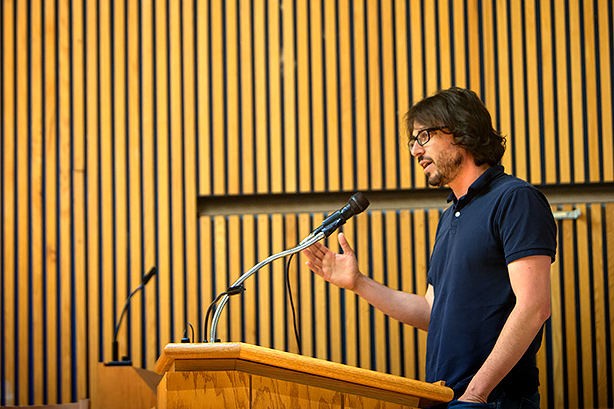
Dan Cohen '05 speaks on campus at the annual Munschauer Lecture on April 21. Photo: Jason Koski/Cornell University Photography.
Dan Cohen '05: A Hollywood matchmaker
Producer Dan Cohen '05 cares deeply about the integrity of the projects he works on. And when he meets a potential director or screenwriter, he cares as much about whether they're someone he can be friends with as about their talent.
"You only want to develop a script with someone you want to go get beers with," Cohen says. "Because it is a long and challenging process that will ultimately require teamwork and patience from both sides. You're going to get to know each other."
His approach works. His film "Arrival" was nominated for eight Oscars, including best picture and best director; and the Netflix series "Stranger Things" recently won the SAG Ensemble and Producers Guild Awards for best drama series. Other producing credits include the 2013 Sundance hit "The Spectacular Now," "Cut Bank," "Fist Fight" and "Table 19."
In the annual Munschauer Lecture on April 21, sponsored by the College of Arts and Sciences' Career Development office, Cohen told the students packing Hollis Auditorium that success as a producer rests on three things: finding material; finding writers and directors for projects; and building relationships with talent, which makes the first two things possible.
"I think that the core reason I've been able to [connect with talent] is simply because I love movies," Cohen said. "My most unique and powerful skill set is that I simply love filmmaking and love movies and I love educating myself on them. So that when I sit with Damien Chazelle before he becomes a huge director, I can talk 'Three Days of the Condor' with him, and that leads to a project."
Cohen is the Hollywood equivalent of "Fiddler on the Roof's" Yente, making matches between writers, directors and filmmakers. "Some of the most important decisions are what writer and what director are we going to put on this project. If they're not the right match, the project might not get made at all or not made well. If the filmmaker properly connects with the material in their execution, then doors will likely start opening," says Cohen, who was a psychology major at Cornell.
"Arrival" was based on a short story by Ted Chiang, and it took all of Cohen and his boss Dan Levine's persuasive skills to convince him to sell the rights. After two two-hour conversations where Cohen and Levine explained how the movie business worked, Chiang asked how Cohen could guarantee the movie would be good. "And I said, 'We cannot do that. Because if we could, bad movies wouldn't exist.'"
Selling the movie to the studios was harder while working alongside screenwriter Eric Heisserer and Levine. Despite their best pitch, they got rejected everywhere. Instead of giving up, Heisserer, a highly respected and well-paid writer, agreed to write the screenplay on spec, which meant he didn't get paid until the script sold.
Cohen, Levine and Heisserer met dozens of times over the next 20 months. "I would do anything to keep replicating that process of sitting in a room with a writer, just figuring it out," Cohen says. "To me that's the most fun aspect of my job, just going back and forth with a really smart writer. And seeing the story evolve from an idea into a full fledged story."
Originally Cohen wanted to be a screenwriter himself. But after he took a class on film with Nick Davis, M.A. '03, Ph.D. '05, (now a professor at Northwestern University teaching film writing), "I started thinking about films and storytelling in a more subjective and analytical way and started falling in love with it," he says.
Following his graduation from Cornell and while sharing an apartment in L.A. with Ben Frahm '04 and Andrew Mittman '05, Cohen spent six months writing and waiting tables, but says it felt unstructured and unsatisfying. Mittman's job as an assistant at New Line Studios, and the work of the other young creatives that Cohen met at the screenings and parties they frequented, looked more interesting. He ended up getting his first job as an assistant to Adam Shulman, a literary manager, at The Firm in late 2005; he's now executive vice president at 21 Laps Entertainment.
Cohen attributes his skill at pitching and salesmanship in part to "walking into strangers' homes with knives and walking out with money" Ð which is how his boss described his high school job selling Cutco Knives. "The more you did it the better you got at pitching it, and so the trajectory of confidence and salesmanship had tangible results," says Cohen. "I don't think my job's that much different É It really comes down to passion and to believing in something and to making your belief in it really felt."
At Cornell, Cohen worked for The Cornell Daily Sun and Cornell Cinema and deejayed at WVBR. "I ran around poking my head and seeing what kind of interested me. And even though I was not quite on target yet, I think it was that sort of freewheeling, exploratory, curious nature that probably helped me when I got to L.A.," he says.
Beyond being passionate and hungry, the most important thing is to stay curious and follow up on things you're interested in, Cohen says. It has certainly worked for him: His upcoming films include the sci-fi thriller "Kin" and the drama "Kodachrome," while "Stranger Things 2" and the best-selling young adult book series adaptation "The Darkest Minds" are shooting.
Linda B. Glaser is a staff writer for the College of Arts and Sciences.